Changing the locks when you move into a new house or apartment is essential for security and peace of mind. It eliminates the risk of former owners or unknown parties having access. Replacing locks lets you upgrade to advanced security systems, bolstering protection against threats. Professional locksmith services guarantee correct installation, enhancing overall safety. Ensuring no duplicate keys are in circulation prevents unauthorized entry and potential breaches. This proactive step not only provides physical security but also fosters a sense of control and exclusivity. Discover more about the benefits and best practices for securing your new home.
Introduction
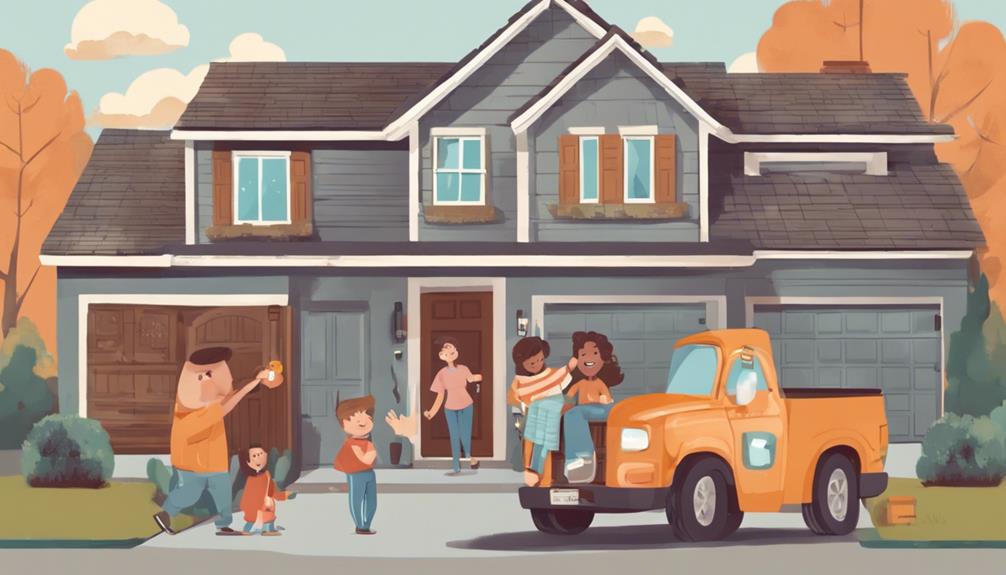
Ensuring home security is paramount when moving into a new residence, as it greatly reduces the risk of unauthorized access. Many new homeowners overlook the essential step of changing locks, potentially leaving their property vulnerable to former occupants or service personnel. Addressing this vital task not only provides peace of mind but also presents an excellent opportunity to upgrade to more advanced security systems.
Importance of Home Security in a New Residence
When moving into a new residence, prioritizing home security by changing the locks is an essential step to safeguard against unauthorized access and guarantee peace of mind. This proactive measure reduces the risk of former owners, tenants, or contractors having entry to your property. It empowers you with complete control over who can access your home, thereby enhancing overall security. Additionally, changing the locks presents an excellent opportunity to upgrade to advanced keyless entry or smart lock systems, offering both convenience and heightened protection. Endorsed by real estate agents and security experts alike, this practice is an important component of ensuring the safety and security of your new living environment, reinforcing the sanctity and privacy of your new home.
Common Oversights When Moving Into a New Home
A common yet critical oversight when moving into a new home is neglecting to change the locks, which can compromise both security and privacy. Many new homeowners assume that previous occupants have returned all keys, but this assumption can be dangerously flawed. Prior tenants, contractors, or even neighbors might still possess spare keys, posing a potential threat to your safety. This oversight can lead to unauthorized access, resulting in security breaches and privacy concerns. Ensuring that the locks are changed provides peace of mind and control over who can enter your property. By taking this essential step, you safeguard your home and protect your loved ones, establishing a secure and private environment from the very beginning.
Ensuring Previous Owners Don’t Have Access
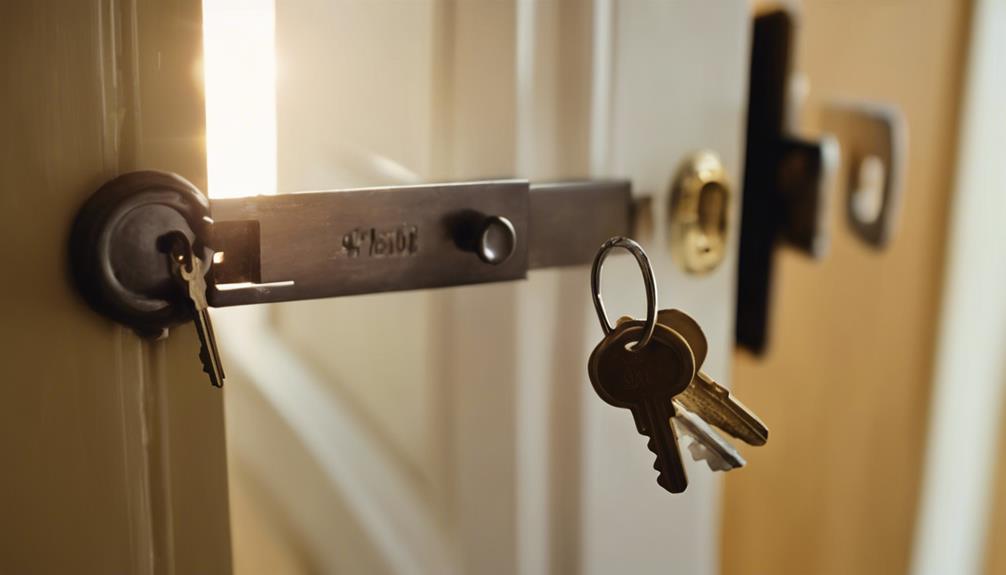
Ensuring that previous owners or tenants do not have access to your new home is essential for maintaining security and peace of mind. Instances of unauthorized entry by former residents, although rare, highlight the importance of changing locks immediately upon moving in. Real-life examples demonstrate that taking this proactive step can greatly reduce the risk of unwanted intrusions and safeguard your investment.
Risks Associated with Previous Residents
Changing the locks on your new home is a critical step in safeguarding against unauthorized access by previous residents and their acquaintances. Previous occupants may have distributed spare keys to friends, family members, or service providers, creating potential security vulnerabilities. Without changing the locks, you risk unexpected entries that compromise your privacy and safety. Ensuring that previous owners no longer have access not only mitigates these risks but also enhances your overall sense of control and security. By taking immediate action to replace the locks upon moving in, you eliminate the uncertainties associated with unknown key holders and establish a secure foundation for your new living environment. Prioritizing this measure is essential for a secure and worry-free home.
In numerous real-life instances, the failure to change locks has led to unsettling cases of unauthorized entry, underscoring the critical need for new homeowners to take immediate action to secure their property. For example, one homeowner lost an engagement ring due to previous owners retaining spare keys. Another tenant encountered an unexpected maintenance person in their apartment because old keys were still functional. Additionally, tradespeople had unauthorized access to new builds, illuminating significant security gaps. These instances, including malicious intents by individuals with old keys, emphasize the importance of changing locks. By doing so, new homeowners prevent former owners or contractors from entering the property without authorization, thereby ensuring their safety and peace of mind.
Protection Against Duplicate Keys
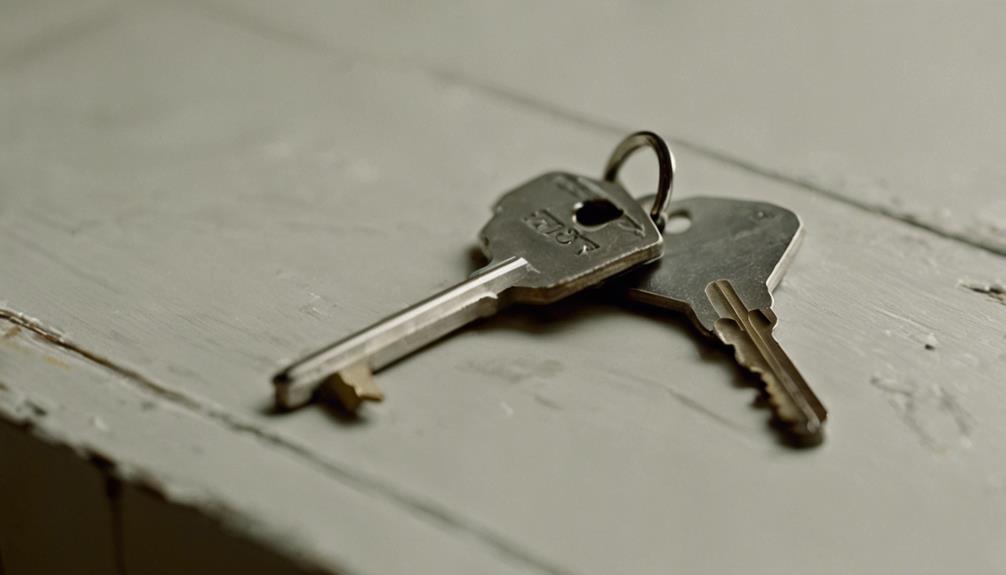
Ensuring your new home’s security begins with addressing the potential threat posed by duplicate keys. These duplicates can easily exist due to lost or unreturned keys from previous owners, tenants, or contractors, creating a significant security risk. By changing the locks, you gain complete control over access, safeguarding your privacy and ensuring that only trusted individuals possess keys to your property.
How Duplicate Keys Could Be a Security Threat
Duplicate keys can greatly compromise the security of your new home, as previous owners, tenants, or contractors might still possess copies that grant them unauthorized access. This lack of control over who has duplicate keys dramatically increases the risk of break-ins and privacy breaches. Imagine the unsettling possibility of strangers entering your property without your knowledge, jeopardizing your safety and peace of mind. By changing the locks immediately upon moving in, you eliminate this critical vulnerability. This proactive measure guarantees that only you and those you trust have access to your home, providing a fortified barrier against potential security threats. Take control of your home’s security by mitigating the risks associated with unaccounted-for duplicate keys.
Scenarios Where Duplicate Keys Could Exist
Understanding the various scenarios where duplicate keys might exist is paramount to safeguarding your new home from unauthorized access. Previous homeowners often distribute spare keys to neighbors, friends, or family, which increases the risk of unauthorized entry. Additionally, contractors, real estate agents, or cleaning services may retain copies of keys, posing a significant security threat. Former tenants or roommates might still possess duplicate keys, potentially compromising your safety. Furthermore, lost or misplaced keys by previous occupants could have fallen into the wrong hands, making a lock change essential. Failing to change locks heightens the likelihood of unauthorized entry, leaving your new home vulnerable. Taking control by changing your locks ensures your security and peace of mind.
Upgrading to More Secure Locks
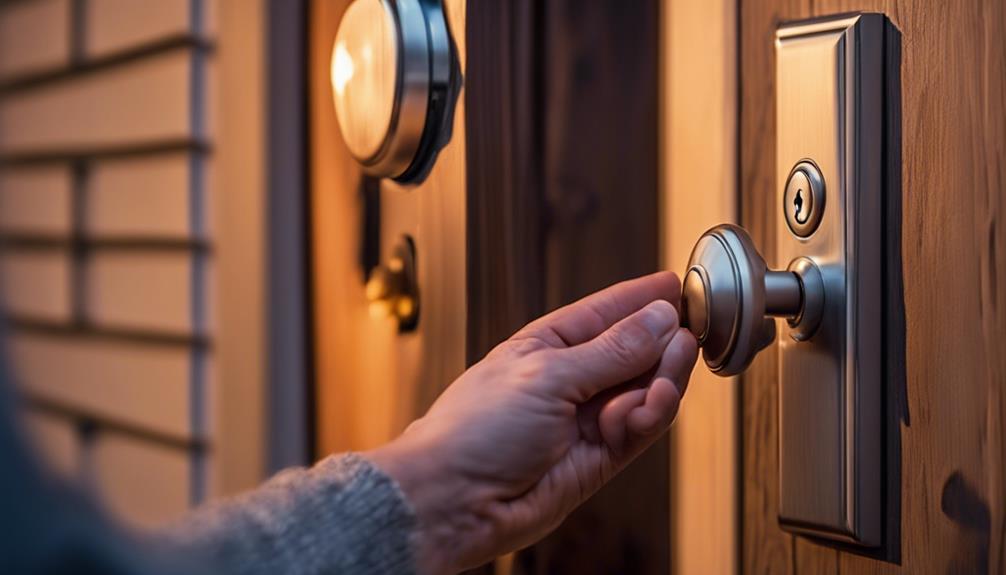
Upgrading to more secure locks can markedly enhance your home’s safety, offering advanced technologies like keyless entry, smartphone access, and video monitoring. These modern lock systems provide superior protection compared to traditional locks, effectively safeguarding against break-ins and unauthorized access. Embracing these innovations not only fortifies your home’s defenses but also grants you greater peace of mind.
Advantages of Modern Lock Technologies
How can modern lock technologies transform your home security and convenience? Upgrading to state-of-the-art locks like keyless entry systems or smart locks can greatly enhance your home’s security. These advanced systems offer exceptional convenience with features such as remote access control and real-time monitoring, allowing you to manage your locks from anywhere. Integration with home automation systems enables seamless compatibility with other smart devices, creating a cohesive smart home environment. Additionally, modern locks utilize biometric authentication and encrypted communication protocols, providing a superior level of security against unauthorized access. Investing in these technologies not only secures your home but also future-proofs it against evolving security threats and technological advancements, ensuring peace of mind and control over your living space.
Comparison Between Old and New Lock Systems
While modern lock technologies offer revolutionary advancements in home security and convenience, comparing these systems to older locks highlights the significant improvements that can be achieved by upgrading to more secure options. Old locks are particularly susceptible to picking, bumping, and other forced entry techniques, leaving your property vulnerable. In contrast, new lock systems boast advanced security features such as keyless entry and smart technology, providing enhanced control and convenience. Investing in these modern solutions not only minimizes the risk of unauthorized access and break-ins but also empowers homeowners with greater oversight of their security. By proactively upgrading, you guarantee that your home benefits from the latest advancements in lock technology, offering peace of mind and robust protection.
Peace of Mind and Safety for Your Family
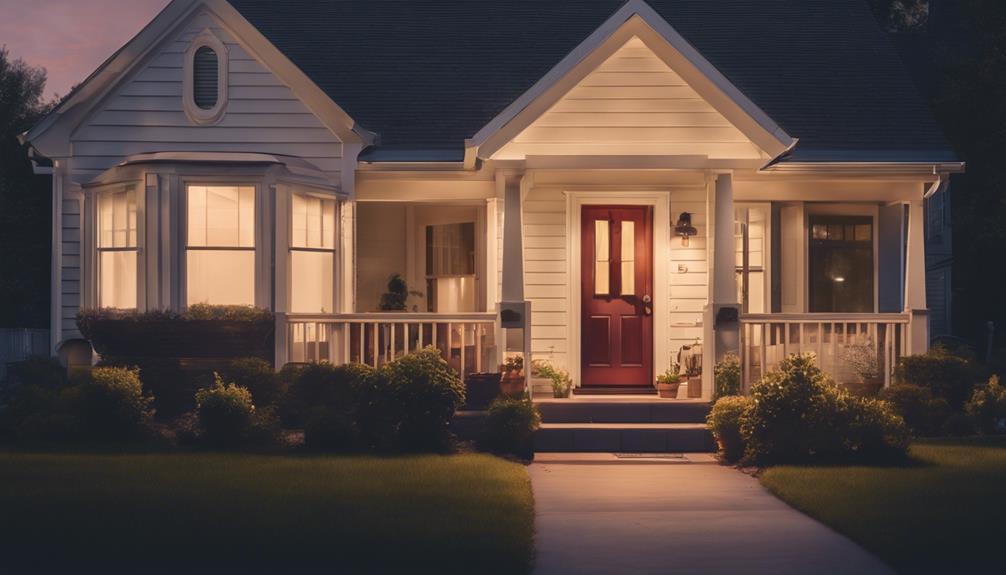
When you change the locks upon moving into a new home, the psychological benefits are immense, providing peace of mind and a sense of security for your family. This simple yet effective step creates a safe environment for children and pets, ensuring that only trusted individuals have access. By prioritizing lock changes, you greatly enhance the overall safety and privacy of your new living space.
Psychological Benefits of Changing Locks
Changing the locks upon moving into a new home offers a significant psychological benefit by providing a heightened sense of security and peace of mind for you and your family. It eliminates the uncertainty of who may have access to your property, thereby reducing potential risks. This proactive measure allows you to establish clear boundaries and a fresh start in your living space. Knowing that you have exclusive control over who possesses keys to your home can alleviate anxiety and foster a sense of safety. Additionally, this action promotes a positive mindset, as taking control of your environment contributes to an overall feeling of empowerment and well-being. Ultimately, changing the locks is an essential step in ensuring your family’s security and peace of mind.
Creating a Safe Environment for Children and Pets
Ensuring a safe environment for children and pets is paramount when moving into a new home, and changing the locks plays an essential role in achieving this objective. By updating the locks, you prevent unauthorized access, ensuring that only trusted individuals can enter your home. This pivotal step eliminates the risk of previous owners or contractors gaining entry, thereby safeguarding your family. Additionally, new locks can prevent accidental lockouts, reducing the likelihood of children or pets being trapped inside. Customizing your home’s security features to meet specific needs further enhances safety. Ultimately, this proactive measure offers peace of mind and a sense of control, knowing your home is a secure haven for your loved ones.
Compliance with Insurance Requirements
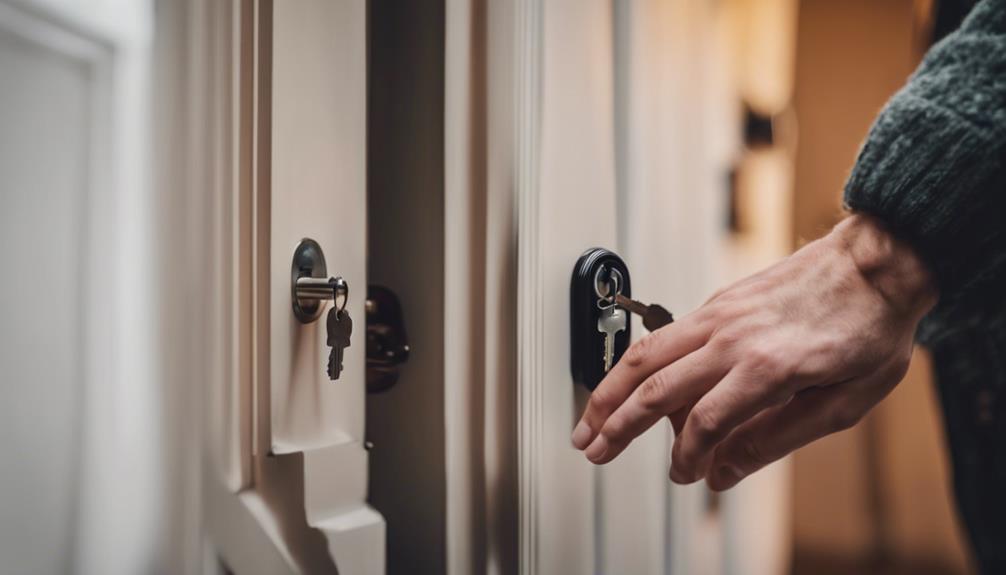
Adhering to insurance requirements is essential when moving into a new home, as many policies mandate changing locks to guarantee coverage. This proactive security measure not only safeguards your property but can also positively impact your insurance premiums, potentially leading to discounts. Understanding the correlation between lock changes and insurance benefits is vital for both maintaining coverage and enhancing home security.
Insurance Policies and Security Measures
To guarantee your new home is fully protected and your insurance policy remains valid, it is essential to understand and comply with the specific lock change requirements stipulated by your insurance provider. Insurance policies often mandate lock changes to ensure coverage eligibility and to safeguard against potential claim denials in the event of a break-in. Adhering to these requirements is vital, as failure to change locks as per guidelines can impact coverage for stolen items. Changing locks post-home purchase is a proactive step to align with insurance security measures, providing an added layer of protection. Always confirm with your insurance provider about their specific lock change mandates to ensure full compliance and peace of mind.
How Changing Locks Can Affect Your Insurance Premium
Adhering to lock change requirements not only secures your home and complies with insurance mandates but can also positively influence your insurance premium by potentially lowering it through enhanced security measures. Insurance companies often recognize the reduced risk of break-ins and theft that comes with updated locks, which may translate into discounts or incentives on your policy. Additionally, some policies explicitly mandate homeowners to change locks upon moving in to maintain coverage. This compliance guarantees that your property is fully protected under your insurance plan. By taking the proactive step of securing your home with new locks, you align with insurer expectations and can enjoy cost savings on your premiums, offering you both peace of mind and financial benefits.
Preventing Access from Unwanted Visitors
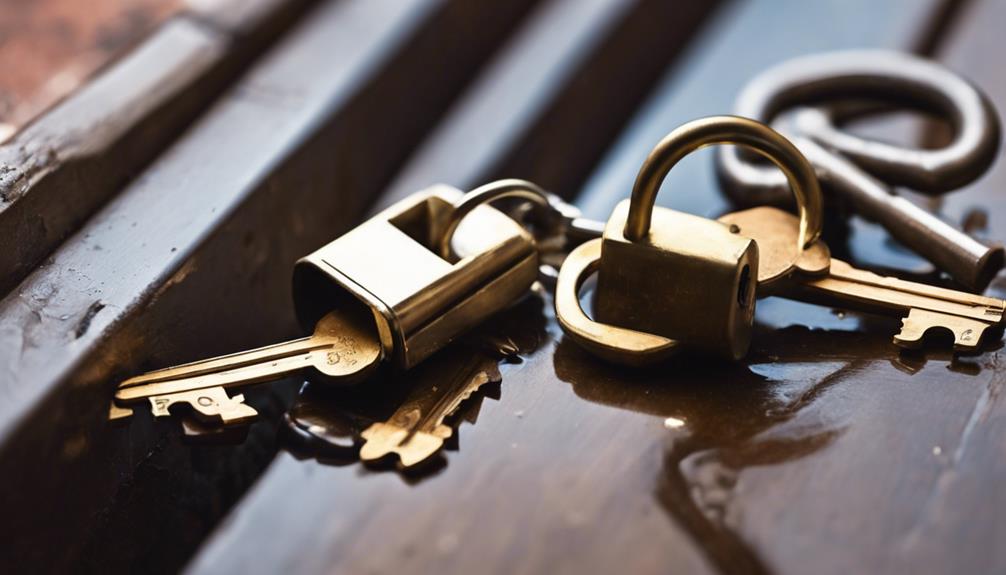
Preventing access from unwanted visitors is essential in safeguarding the safety and security of your new home. By identifying and mitigating risks such as lost or unreturned keys, you can greatly reduce the likelihood of unauthorized entry. Addressing these potential vulnerabilities promptly ensures that only trusted individuals have access to your property, providing you with peace of mind.
Identifying and Mitigating Risks of Unwanted Access
Replacing the locks when moving into a new house or apartment is an important step in mitigating the risks of unauthorized access by previous occupants or individuals with existing keys. This proactive measure prevents unwanted visitors from entering your property without your permission, effectively safeguarding your security and privacy. By changing the locks, you guarantee that only trusted individuals have access to your home, providing peace of mind and enhanced protection. Unauthorized access can lead to potential risks such as break-ins, theft, or unexpected encounters, making it essential to address this vulnerability immediately. Taking control of your home’s security by updating the locks is a straightforward yet powerful way to prevent these risks and secure your living environment.
How to Handle Lost or Unreturned Keys
Addressing the issue of lost or unreturned keys promptly is essential for maintaining the security and privacy of your property, as these keys can potentially fall into the hands of unauthorized individuals. The risk of unwanted visitors gaining access necessitates immediate action. Changing the locks is a vital step, effectively preventing unauthorized entry by those who may possess the lost keys. Alternatively, rekeying the locks can render the misplaced keys useless, ensuring that only authorized individuals have access. Swiftly addressing lost or unreturned keys not only mitigates potential security breaches but also reinforces your control over the property. By taking these actions, you uphold the safety and peace of mind essential for a secure living environment.
Opportunities to Upgrade Security Systems
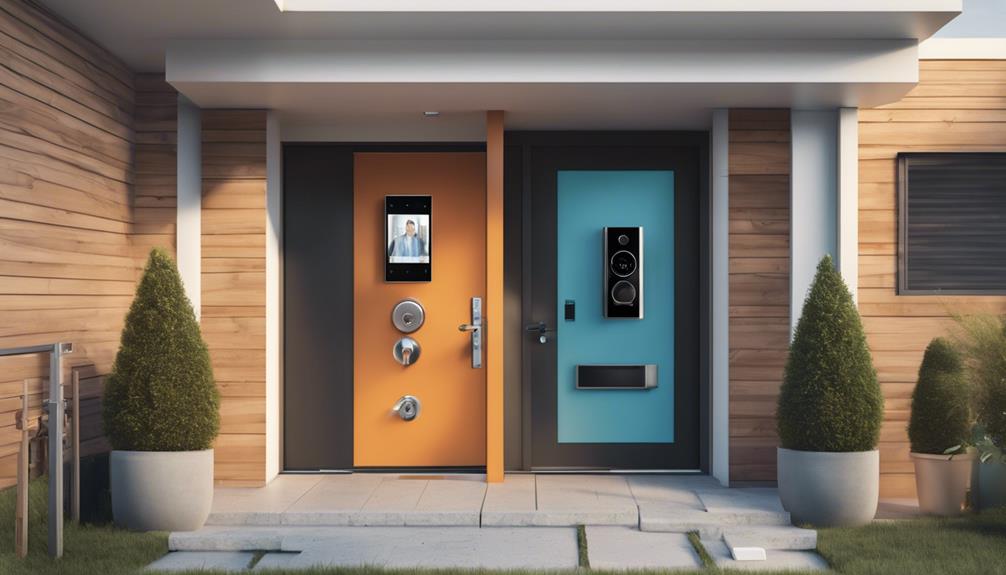
Changing locks when moving into a new home provides an excellent opportunity to upgrade to modern security systems. Integrating smart locks with advanced surveillance systems not only enhances security but also offers features like remote access control and real-time activity monitoring. These technologies can seamlessly connect with home automation systems, providing a complete and customizable security solution for homeowners.
Integrating Locks with Modern Security Systems
Integrating modern security systems with advanced lock technologies, such as keyless entry and smart locks, often provides homeowners a sophisticated blend of convenience, control, and enhanced security. These systems enable seamless monitoring and control through smartphone apps, allowing remote access and real-time alerts. This integration not only simplifies entry but also guarantees that homeowners can customize security settings to fit their unique needs. Enhanced features such as real-time notifications offer peace of mind, ensuring immediate awareness of any security breaches. Upgrading to smart locks can greatly strengthen home protection by allowing homeowners to monitor and manage entry points effortlessly. By integrating these advanced systems, homeowners achieve a higher level of security and control over their living environments.
Benefits of Smart Locks and Surveillance Systems
Harnessing the advanced capabilities of smart locks and surveillance systems can greatly enhance the security and convenience of your home, offering a strong opportunity to upgrade traditional security measures. Smart locks provide keyless entry options through smartphone or code entry, eliminating the need for physical keys and enhancing access control. Integrated with home automation systems, they offer seamless management of your security. Surveillance systems, on the other hand, provide real-time monitoring, deterring potential intruders and capturing valuable evidence during security breaches. This dual approach not only prevents unauthorized access but also offers peace of mind by ensuring constant vigilance. By adopting these advanced technologies, homeowners can significantly strengthen their property’s security while enjoying unparalleled convenience and control.
Professional Locksmith Services for Lock Changes
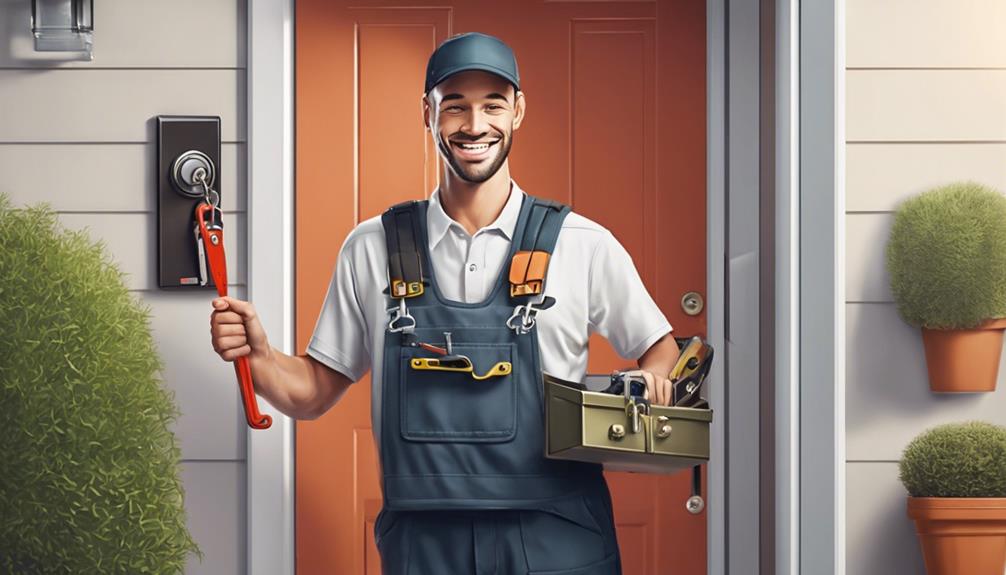
Engaging professional locksmith services, such as those provided by Low Rate Locksmith, guarantees that your new home’s locks are installed correctly and securely. These experts offer a range of services, including the installation of high-security locks and master key systems, tailored to enhance your home’s safety and convenience. With 24/7 availability, they provide reliable assistance for urgent lock changes, giving you peace of mind during your move to a new residence.
Why Hire a Professional Locksmith
When it comes to guaranteeing the security and functionality of your home’s locks, hiring a professional locksmith offers unparalleled expertise and peace of mind. Professional locksmiths possess the knowledge to select secure lock options tailored to your specific needs, providing excellent protection. Their meticulous installation ensures that locks function correctly and securely. For added convenience and security, they offer advanced solutions like master key systems and keyless entry options. Additionally, locksmiths adeptly handle non-standard or vintage lock fittings, preserving both safety and aesthetics. With 24/7 availability, they provide dependable emergency services, ensuring your property remains secure at all times. By entrusting a professional, you gain control over your home’s security with confidence and reliability.
Services Offered by Low Rate Locksmith for New Homeowners
Drawing on the significance of professional locksmith expertise, Low Rate Locksmith provides extensive services customized particularly for new homeowners looking to change their locks and secure their new properties. Their professional locksmith services guarantee that all locks are secure and functioning at their best, enhancing overall home security. With expertise in installing a variety of lock types, Low Rate Locksmith tailors their services to meet the specific needs of each homeowner. Their efficient and reliable lock change services offer new homeowners peace of mind. Utilizing Low Rate Locksmith’s services enables homeowners to customize their home security with quality lock installations, ensuring a safe and secure living environment from the moment they move in.
Cost and Convenience of Changing Locks
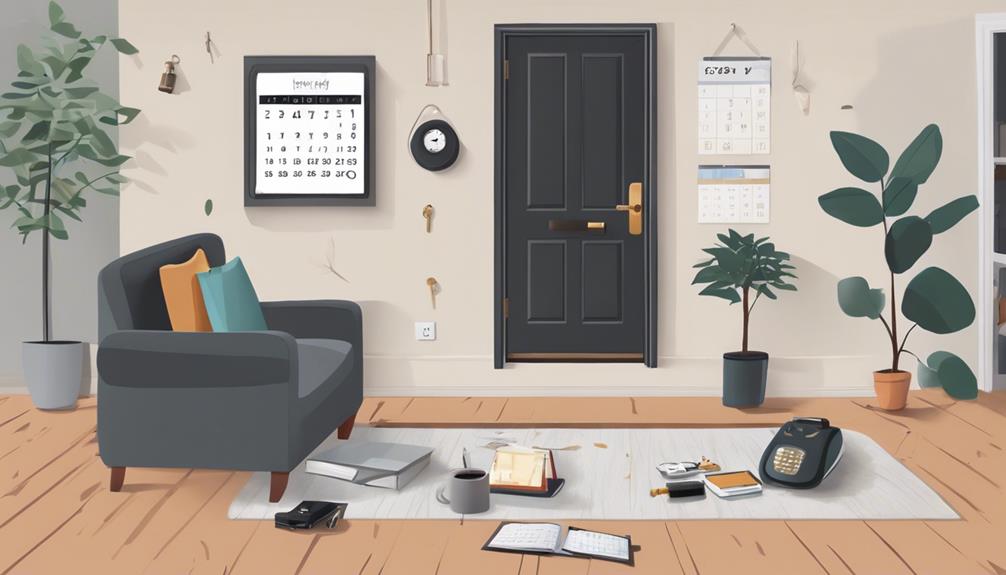
When considering the cost and convenience of changing locks, homeowners can expect to spend between $100 and $300, contingent on the lock type and locksmith fees. Opting for a professional locksmith guarantees proper installation, enhancing security and ensuring peace of mind. For those seeking cost-effective solutions, discounts on bulk lock changes and the option for DIY installations present additional avenues for achieving secure and convenient home access.
Breakdown of Costs Involved in Changing Locks
Changing locks when buying or moving into a house or apartment involves various costs and considerations, making it important to understand the financial and practical implications. The cost of changing locks can range from $40 to $100 for rekeying services, while complete lock replacements might run into several hundred dollars. Locksmith fees vary based on the complexity of the job and the type of locks being installed. DIY lock changes can be a more economical option, though they may not be suitable for all situations. Additionally, some locksmiths offer discounts for changing multiple locks simultaneously, enhancing cost-effectiveness. The expense of changing locks is justified by the immediate security and peace of mind it provides, ensuring a secure new home environment.
Convenient and Quick Lock Change Solutions
Choosing professional locksmith services guarantees a convenient and swift lock change, transforming your new residence into a secure haven within just a few hours. With costs ranging from $100 to $400, depending on the type of locks and locksmith fees, this investment can be tailored to fit various budgets. Many locksmiths offer discounts for bulk lock changes, further optimizing your expenses. While DIY solutions might seem cost-effective, they often lack the expertise and efficiency provided by professionals. The speed and convenience of professional services not only save time but also provide a higher level of security. Ultimately, this small expenditure offers significant peace of mind, making it a highly worthwhile step in securing your new home.
Tips for Choosing the Right Locks for Your New Home
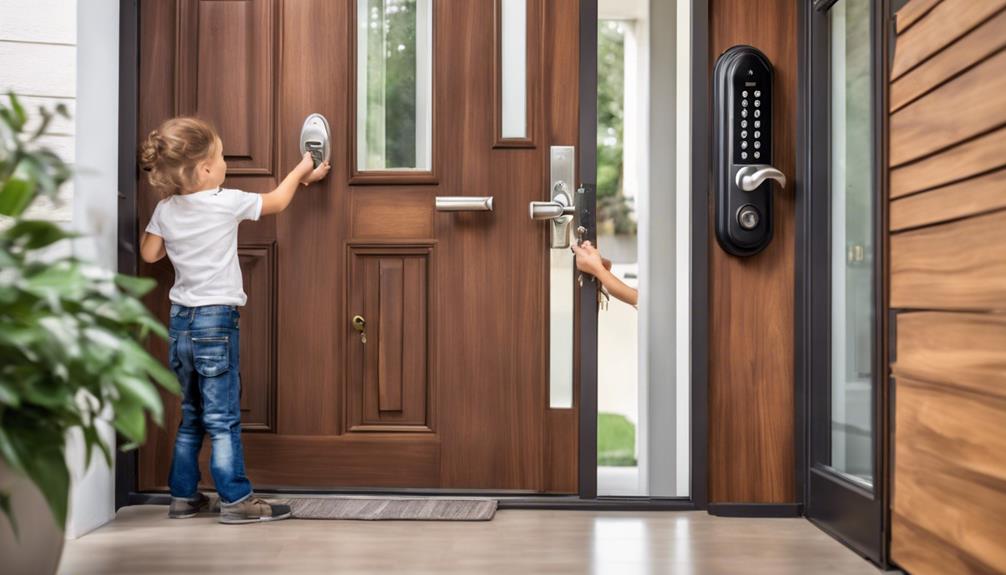
When selecting locks for your new home, it’s important to take into account both functionality and security. Evaluate the types of entry systems available, such as keyless, keypad, or traditional key locks, and prioritize those with robust security features, including resistance to picking and drilling. Additionally, make sure the locks meet high ANSI grading standards and complement your home’s aesthetic while exploring smart locks for enhanced convenience and integration with home automation.
Factors to Consider When Selecting Locks
Selecting the right locks for your new home involves carefully evaluating several critical factors to guarantee top security and durability. Begin by considering the type of lock that aligns with your security preferences, such as deadbolts, smart locks, or keyless entry systems. Confirm the locks meet industry standards, such as ANSI/BHMA grading or UL certifications, for proven durability and security. Examine the material—opt for solid brass or stainless steel to ensure longevity and resistance to tampering. Look for features like bump-proof technology, anti-drill protection, and pick-resistant mechanisms to enhance security. Finally, assess compatibility with your existing door hardware and potential integration with smart home systems for added convenience and control.
Recommendations for Different Types of Locks Based on Needs
To guarantee your new home is both secure and convenient, consider these tailored recommendations for different types of locks based on your specific needs and preferences. For basic security, traditional deadbolts or knob locks offer cost-effective solutions. If convenience and remote control are priorities, smart locks with keyless entry features are ideal. For maximum protection, high-security locks with pick-resistant cylinders are recommended. Multi-point locking systems provide enhanced security for UPVC doors through multiple locking points. Always consult with a locksmith to determine the best lock type tailored to your home’s specific security requirements. By thoughtfully selecting your locks, you can ensure peace of mind and exert greater control over your home’s security.
Conclusion
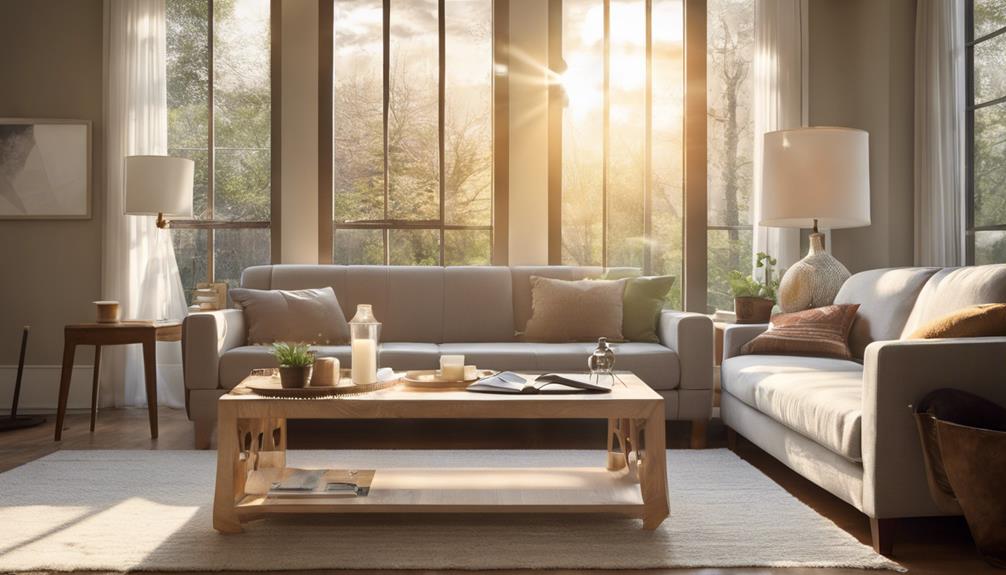
To sum up, altering locks when purchasing or moving into a house is crucial for ensuring your home’s security and peace of mind. By rekeying or replacing locks, new homeowners can prevent unauthorized access from previous key holders and greatly reduce the risk of security breaches. We strongly encourage taking this essential step to safeguard your new residence and provide exclusive access to trusted individuals.
Recap of the Importance of Changing Locks
Ensuring the security of your new home by changing the locks immediately upon moving in is a critical step that provides exclusive access, peace of mind, and protection against unauthorized entry. This simple yet effective measure eliminates the possibility of former homeowners, contractors, or others with old keys accessing your property. Additionally, upgrading to modern security features, such as keyless entry or smart locks, offers enhanced protection and convenience. Immediate lock changes mitigate potential security breaches, making your home more secure from day one. Customizing your security setup to include advanced technologies like smartphone access further elevates your home’s safety, ensuring that you maintain complete control over who can enter your sanctuary.
Encouragement to Take Action for Improved Home Security
Taking proactive measures to enhance the safety of your new home by changing the locks can greatly reduce the risk of unauthorized access and provide invaluable peace of mind. This simple yet effective step eliminates the possibility of former owners, contractors, or unknown parties retaining keys to your property. By ensuring exclusive control over who enters your home, you lower the risks of break-ins, theft, and privacy breaches. Real estate professionals consistently recommend this practice as an essential part of moving into a new residence. Embrace this opportunity to reinforce your security, knowing that you have taken a crucial step toward safeguarding your sanctuary. Don’t leave your home’s safety to chance—act now to secure your investment and peace of mind.
Frequently Asked Questions
How Long Does It Typically Take to Change All the Locks in a Home?
On average, changing all the locks in a home takes between 1 to 3 hours, a statistic that highlights the efficiency of professional locksmiths. Factors such as the number of locks and their complexity can affect this timeframe. Utilizing a locksmith guarantees a swift and secure process, often completed in a single appointment, thereby minimizing disruptions. This approach offers a superior solution to DIY methods, enhancing overall security.
Are There Any Specific Locks Recommended for Rental Properties?
When selecting locks for rental properties, high-security options such as deadbolts, smart locks, and ANSI Grade 1 or 2 locks are highly recommended. These locks provide robust security, ease of rekeying, and enhanced control over access. Smart locks, in particular, offer the convenience of keyless entry and remote management, ensuring both landlords and tenants feel secure and in control of property access.
Can I Change the Locks Myself or Should I Hire a Professional?
In the digital age, safeguarding your property’s security is crucial. While changing locks yourself can save money, hiring a professional guarantees precise installation and top-notch security. Professionals bring expertise in handling non-standard locks and offer advanced options like master key systems and keyless entry. DIY attempts risk incorrect measurements and compromised security. With 24/7 availability, locksmiths ensure the highest standard of secure lock installations, granting you peace of mind and control.
What Should I Do With the Old Locks After They Are Replaced?
After replacing old locks, consider donating them to community centers or schools. Alternatively, recycle them at designated drop-off points or through metal recycling programs. Consult local waste management for responsible disposal. Additionally, selling old locks online or at flea markets can appeal to DIY enthusiasts or collectors. For a creative touch, repurpose them for craft projects or home decor, giving them a new lease on life.
Are Smart Locks More Secure Than Traditional Locks?
When comparing smart locks to traditional locks, it’s like comparing a fortress to a wooden gate. Smart locks offer superior security features such as encryption, remote access control, and biometric authentication. These advanced capabilities greatly reduce vulnerabilities like lock picking and key duplication. Additionally, smart locks integrate seamlessly with home automation systems, providing enhanced convenience and monitoring through activity logs and tamper alerts, offering more control and transparency to homeowners.








